Thanksgiving Greetings from My Family to Yours
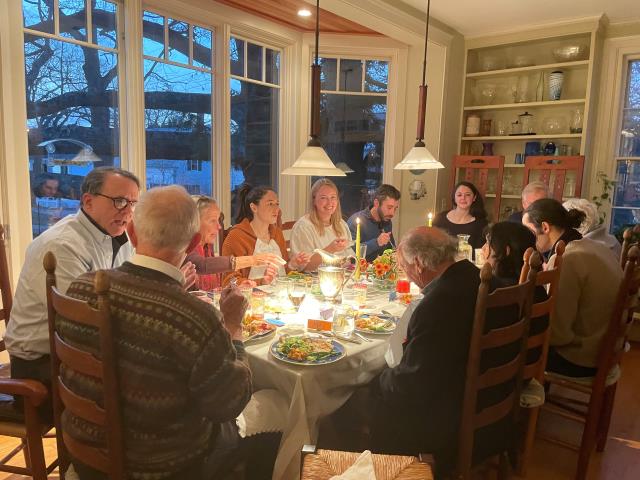
A happy (belated) Thanksgiving from my family to yours. I hope everyone was able to gather around a table with loved ones to enjoy a good meal (like ours pictured above), some hearty laughs, and maybe just a bit too much pie.
The past few months have been busy ones – with lots of news coming from both Washington and Maine. Here’s a bit of what's been going on.
Protecting A Fundamental Right

Marriage is one of life’s great gifts; it brings companionship, support, love, and joy. The decision to get married is a deeply personal choice between two people who love each other, it’s not an easy decision, and it’s not one where the government should have a say. My decades-long marriage to my wife Mary has been among the greatest privileges of my life. We were lucky that that our marriage did not face legal barriers, and there shouldn’t be for others who share the same love.
That’s why I was proud to join a bipartisan group of my colleagues this month in passing the Respect For Marriage Act, a historic, long-overdue step to ensure Americans can marry the person they love without government interference. Maine has long understood this fundamental right – it’s why we were the first state in the nation to legalize same-sex civil marriage by popular vote.
The Respect for Marriage Act does two primary things:
- First, it requires the federal government to recognize a marriage between two individuals if the marriage was valid in the state where it was performed.
- Second, the bill guarantees that valid marriages between two individuals are given full legal faith and credit, regardless of the couple’s sex, race, ethnicity, or national origin.
It’s unfortunate that a law protecting the right to marry the person you love is even necessary. But with an activist Supreme Court seeking to impose its religious views on the country and indicating it was reconsidering marriage equality rights, I feel this effort was critical to defend current and future loving couples.
I’m deeply grateful that the Senate was able to come together and pass a commonsense, bipartisan law that carefully enshrines the right to same-sex and interracial marriage while respecting religious freedoms.
Honoring Those Who Served
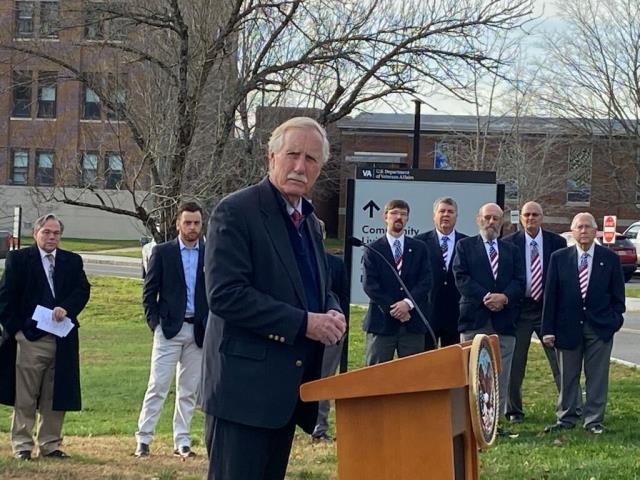
In 1954, President Dwight D. Eisenhower issued the first Veterans Day Proclamation declaring November 11th as a day of ‘common purpose’ for all Americans to ‘remember the sacrifices of those who fought so valiantly to preserve our freedoms.’ Nearly 70 years later, Americans came together on Veterans Day this month bound by this same common purpose – honoring our servicemembers and to caring for those who have shouldered the burden of our nation’s defense.
The Augusta and Brunswick Veterans Day ceremonies this year were powerful reminders of this selfless choice, and of how many Maine people have embodied the Dirigo motto and proudly fought for the United States.
Marching down Main Street in uniform were our neighbors, teachers, store owners, and loved ones. With one of the nation’s highest rates of veterans per capita, those who served are woven into the fabric of every town and city across our state. Each of them made extraordinary sacrifices for our nation and continue to make immense, positive contributions to our communities today.
The ceremonies were also an important reminder of the commitment Americans share to serve our veterans just as they have served us.
That means delivering stronger benefits, better healthcare, and improved educational and economic opportunities for those who served. These are all areas where, historically, the country has not done enough.
Veterans deserve better, and this Congress is acting. Earlier this year, Congress overwhelmingly passed the bipartisan PACT Act to support veterans exposed to burn pits and toxic hazards. We're also working on legislation to protect our veterans from benefits fraud, expand senior veterans’ access to assisted living services, and better recognize the sacrifices of Purple Heart medal recipients.
It's all good progress, but there is still much more work to be done. Today and every day, we must recommit ourselves to improving the lives of American veterans.
Investing in the Future of Maine's Forest Economy

I'm a perpetual optimist. I think that it's almost always easier to solve a problem if you can look at the opportunities you have, rather than just focusing on the downsides. It's no secret that Maine's forest products industry has faced some real challenges over the last few years, but with some significant investments that have been announced this fall, I think we can be optimistic about the future of Maine's forest economy and rural communities.
At the Somerset Mill in Skowhegan, Sappi North America announced a $418 million investment this month to convert Paper Machine No. 2 to a new specialty board line and double production capacity. Construction of the expansion is expected to create 1,000 contractor jobs and will help Sappi continue to support their workers and the Skowhegan community.
A bit further north, LP Houlton announced they're making a $400 million investment to increase the facility’s capacity by 340 million square feet of new siding a year. It's a huge expansion that is expected to create approximately 100 jobs and enough siding for 100,000 homes a year.
This is in addition to the $150 million new facility I visited (pictured above) at LP Houlton earlier this summer.
A key similarity between the investments at LP and Sappi: they're both for new lines of forest products that weren't produced or sold even just a few years ago. These new products and opportunities like cross-laminated timber will mean new markets, new jobs, and stronger communities across rural Maine.
This doesn't mean that the road ahead for our forest economy is an easy one; but with these investments and the unbeatable work ethic of people across the industry, I'm confident that the future remains bright. Together, we’re going to continue to create new opportunities and solidify the foundation of our heritage industries for generations to come.
Keeping the Free World Safe
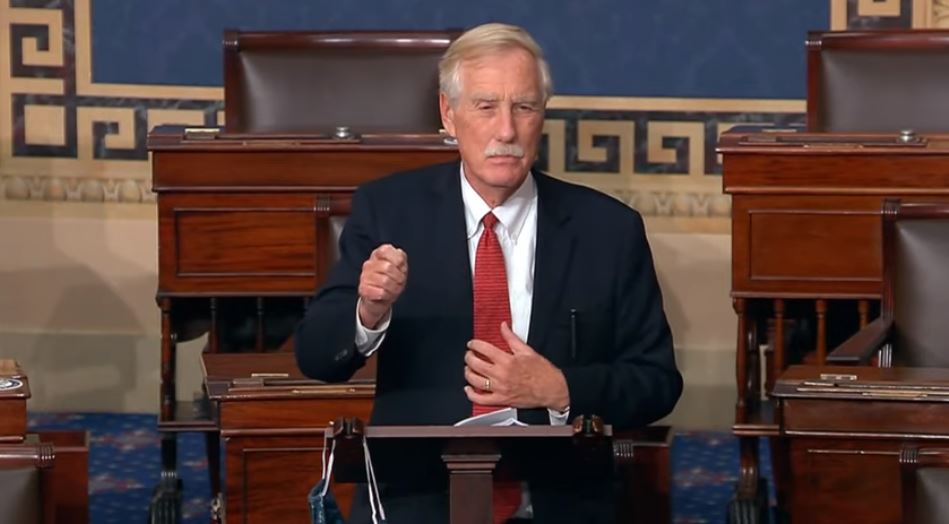
I sometimes get asked 'why does America spend so much on our national defense? Why do we have ships and airplanes and space capabilities?' Well, Google Rhineland, 1936 or Sudetenland,1938 – where Hitler began his war across Europe. Had he faced even a small amount of resistance then and there, he could have been stopped and millions of lives would have been saved.
This fundamental lesson of deterrence has been the essence of the Free World's defense policy ever since. That in order to prevent large scale war and tragedy like World War Two, our adversaries must know that we can impose catastrophic, unacceptable costs.
It is this principle that has helped secure decades of relative peace between world powers, and it is the basis of our annual bipartisan defense bill – the National Defense Authorization Act (NDAA). Earlier this month, I spoke from the Senate Floor about the importance of the bill and some of its key provisions that are needed to maintain modern, credible deterrents.
One of the most urgent parts of the NDAA is an effort to modernize the nation's nuclear arsenal and defenses. With growing threats of nightmare weapons like hypersonic missiles (which fly up to 25 times the speed of sound), America's aging weapons systems, and increased competition from Russia and China, the United States needs to step up our game. Not to prepare for war – but to prevent one.
Nothing has made this need more clear than Vladimir Putin's unprovoked, illegal invasion of Ukraine. I'm a firm believer that when someone tells you who they are, you should believe them. Well, Putin has said time and time again that he wants to rebuild the Soviet Union, and that Ukraine is just the first step.
It's clear that if we want to prevent conflict across Europe, we must stop Putin in Ukraine. That's why the NDAA includes continued support for Ukraine to resist Russian aggression and continue fighting for freedom. It's the easiest, least expensive way to stop a larger war and untold devastation.
Along with these vital (and potentially lifesaving) provisions, the bill also includes a significant pay raise for our troops, more resources for the transition out of service, and investments in suicide research and prevention. The greatest strength of our military has always been those in uniform and this bill delivers on our promises to them.
All told, it's a critical effort to prevent disastrous conflicts, deter Russian aggression, and serve our troops. I hope we can get the bipartisan bill passed swiftly to keep America safe.
Defending Maine Lobstermen
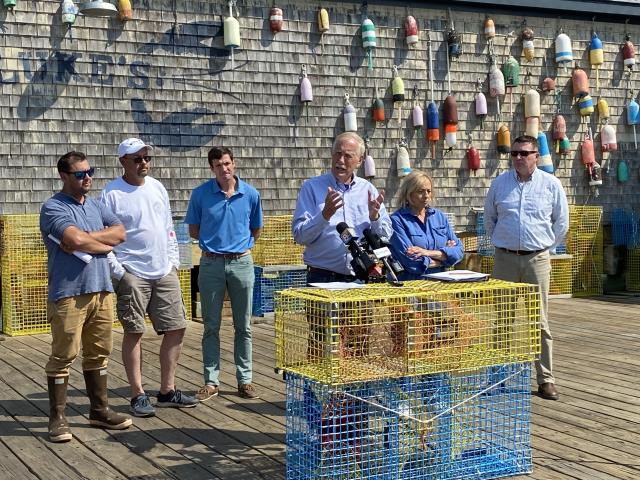
There are few industries more iconic than Maine's lobster fishery. For generations, thousands of Maine lobstermen have taken to our waters to provide for their families, communities, and state. As lobsterman Curt Brown told me in a recent episode of my Inside Maine podcast, they're more than just fishermen, they're responsible stewards who have always worked to maintain the delicate balance in Maine’s waters.
This long proud legacy is partially why it's so frustrating that Maine lobstermen are feeling the impacts of baseless court challenges by misguided environmental groups.
Earlier this month, the Marine Stewardship Council (MSC), an international seafood accreditor announced it is temporarily suspending its certification of Maine’s lobster fishery. While the industry met the highest standards for environmental sustainability and impact, ongoing litigation, based more on activism than evidence, made certification impossible.
To be clear, this is not a reflection of the Maine lobster industry. In fact, the MSC clearly states in its decision, ‘there is no recent evidence that the Maine lobster fishery is responsible for entanglements or interactions with right whales.’ The temporary suspension is purely because activists with an axe to grind have weaponized the court system and the Endangered Species Act to target the livelihoods of thousands of Maine lobstermen.
This is deeply disappointing, and I hope that the MSC will reconsider the decision. In the meantime, we must continue doing everything in our power to support the iconic Maine industry and ensure that lobstermen have the resources they need to continue complying with any federal regulations.
In the face of this threat, the Congressional Delegation secured $1.2 million to support the health of Maine’s lobster industry and help lobstermen adapt to any regulatory changes. It's just the first step, and there's still much more to be done to protect the country’s most valuable and iconic fishery.
Celebrating Historic Investments

This month marked the one year anniversary of President Biden signing the Bipartisan Infrastructure Bill into law. In the last year alone, the historic legislation has already delivered more than $966 million to support 80 projects across the state – including roads, public transit, broadband, and much much more.
All together, the bill has been a once-in-a-generation investment in the connections that power our economy and tie Maine communities together. These infrastructure projects are creating good-paying jobs and will continue to have an immense, positive impact on the day-to-day lives of Maine people for years to come.
The transformational funding is going a long way to help Maine residents access the economic, educational, and healthcare opportunities of the 21st century. Over the past two months, the bill has invested $45 million to replace aging bridges and $5 million for broadband in the most rural of communities.
I’m proud Congress was able to pass this historic legislation and look forward to seeing the benefits across Maine in the months and years ahead.
November Policy Update
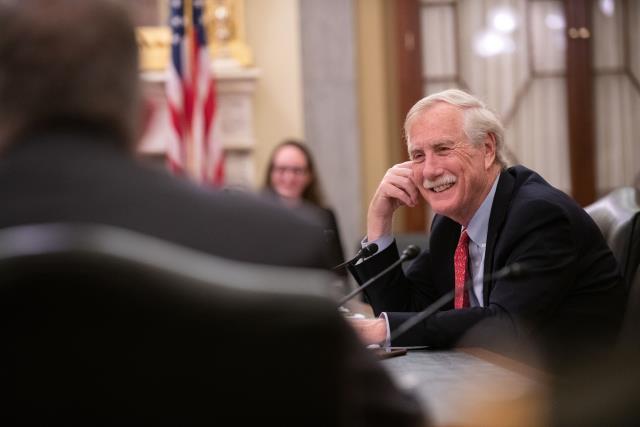
As a reminder, you can read more on my regularly updated press release page at king.senate.gov. Here are some other priorities I’ve been working on:
- Supporting farmers affected by PFAS. The Maine Congressional Delegation is leading a bipartisan, bicameral effort to provide vital assistance to farmers affected by PFAS. Read more HERE.
- Giving Maine fire departments the resources they need. Senator Collins and I announced over $3 million for 23 Maine fire departments to upgrade equipment and support personnel. Read more HERE.
- Ensuring federal broadband grants are delivered in full. I cosponsored a bipartisan bill to maximize the historic broadband funding for residents across Maine by ensuring broadband funding doesn't get taxed. Read more HERE.
- Restoring Atlantic Salmon habitats. Senator Collins and I announced $1,569,333 for four organizations to restore habitats for coastal and marine species in Maine. Read more HERE.
- Helping low-income students. Senators Sherrod Brown (D-Ohio), Rob Portman (R-Ohio), and I have introduced bipartisan legislation to ensure students are not forced to choose between housing or pursuing an education. Read more HERE.
In The News
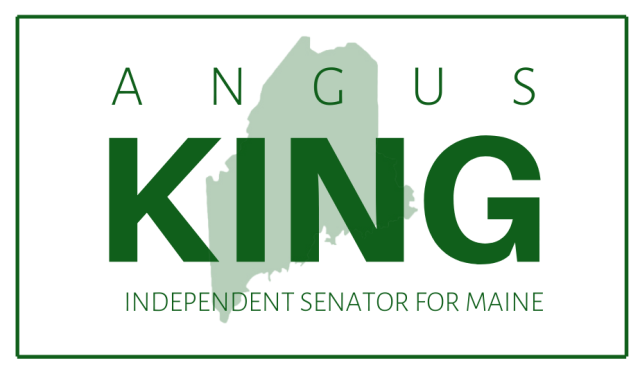
Thanks for subscribing to my monthly newsletter! I would love to hear your ideas for how we can make Maine and our country a better place. Please feel free to reach out with any questions, comments, or concerns by visiting: https://www.king.senate.gov/contact –we look forward to hearing from you.
All the best!

To unsubscribe to this e-Newsletter click HERE.
|